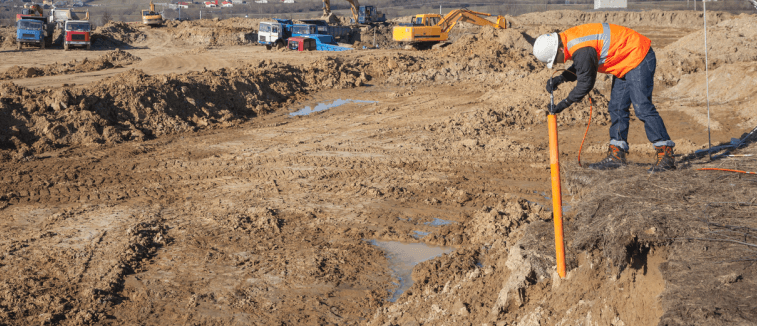Unknown Facts About Geotheta
Unknown Facts About Geotheta
Blog Article
Not known Factual Statements About Geotheta
Table of ContentsGeotheta Can Be Fun For AnyoneGeotheta Fundamentals ExplainedMore About GeothetaThe 45-Second Trick For GeothetaHow Geotheta can Save You Time, Stress, and Money.

They perform site investigations, collect examples, perform laboratory tests, and assess information to review the viability of the ground for building projects - Consulting Engineer. Based on their findings, geotechnical engineers provide referrals for structure layout, slope stability, preserving structures, and mitigation of geotechnical hazards. They team up with various other specialists, such as architects, structural designers, and construction teams, to ensure that geotechnical considerations are integrated into the overall job style and application
By analyzing the habits and residential properties of dirt and rock, they can identify prospective geotechnical threats such as landslides, dirt settlement, or incline instability. Their knowledge assists protect against failings or crashes that could threaten lives and residential or commercial property. Right here are some comprehensive responsibilities and responsibilities of a geotechnical engineer: Site Investigation: Geotechnical engineers conduct site examinations to gather data on subsurface problems.
They analyze the data to comprehend the residential or commercial properties and habits of the dirt and rock, including their toughness, permeability, compaction qualities, and groundwater problems. Geotechnical Evaluation and Style: Geotechnical engineers evaluate the information collected during website investigations to evaluate the stability and viability of the site for construction tasks. They execute geotechnical estimations and modeling to examine factors such as bearing capability, settlement, incline stability, side planet pressures, and groundwater flow.
Some Known Factual Statements About Geotheta
Foundation Style: Geotechnical engineers play a critical function in developing structures that can securely sustain the desired framework. They assess the dirt conditions and load needs to determine the ideal structure kind, such as superficial foundations (e.g., grounds), deep structures (e.g (https://www.openlearning.com/u/ianhammond-shld0k/)., stacks), or specialized strategies like soil improvement. They consider variables such as negotiation limitations, bearing capability, and soil-structure interaction to create optimal structure styles
They evaluate construction plans, screen site activities, and conduct field assessments to verify that the style referrals are adhered to. If unforeseen geotechnical concerns occur, they examine the scenario and provide referrals for removal or modifications to the design. Threat Analysis and Reduction: Geotechnical engineers evaluate geotechnical hazards and threats associated with the project site, such as landslides, liquefaction, or dirt erosion.

Cooperation and Communication: Geotechnical designers work very closely with various other experts associated with a project, such as designers, structural engineers, and building teams. Reliable communication and collaboration are important to integrate geotechnical factors to consider into the overall project style and construction process. Geotechnical designers offer technological competence, solution questions, and make sure that geotechnical needs are satisfied.
Geotheta for Dummies
Here are some Full Report sorts of geotechnical designers: Structure Engineer: Foundation engineers specialize in making and assessing structures for structures. They examine the soil problems, lots requirements, and website characteristics to figure out the most ideal foundation kind and layout, such as superficial structures, deep structures, or specialized methods like stack structures.
They review the aspects affecting incline security, such as dirt residential or commercial properties, groundwater conditions, and slope geometry, and establish techniques to stop incline failures and reduce dangers. Quake Engineer: Quake engineers specialize in examining and making structures to withstand seismic pressures. They assess the seismic risk of a website, evaluate dirt liquefaction potential, and establish seismic style criteria to make certain the security and durability of frameworks throughout earthquakes.
They do field testing, collect examples, and analyze the collected data to characterize the dirt buildings, geologic developments, and groundwater conditions at a site. Geotechnical Instrumentation Designer: Geotechnical instrumentation engineers concentrate on monitoring and determining the behavior of soil, rock, and structures. They set up and preserve instrumentation systems that monitor aspects such as soil settlement, groundwater levels, incline motions, and architectural displacements to analyze efficiency and provide very early warnings of potential concerns.
Some Known Questions About Geotheta.
They carry out examinations such as triaxial examinations, consolidation examinations, direct shear tests, and permeability examinations to gather data for geotechnical evaluation and layout. Geosynthetics Engineer: Geosynthetics engineers concentrate on the style and application of geosynthetic products, such as geotextiles, geogrids, and geomembranes. They make use of these products to enhance dirt stability, reinforce inclines, offer water drainage services, and control erosion.
They tend to be investigatory people, which means they're intellectual, introspective, and curious. They are curious, methodical, rational, logical, and logical. Some of them are likewise social, suggesting they're kind, charitable, cooperative, person, caring, valuable, understanding, sensible, and friendly - Geo Tech Engineer.
In the office setting, geotechnical engineers use specialized software application tools to perform calculations, develop styles, and examine data. They prepare records, review project specifications, interact with clients and staff member, and coordinate project activities. The office setting supplies a favorable setting for research, analysis, and partnership with various other professionals associated with the task.
Geotheta for Dummies
They frequently go to task sites to conduct site examinations, analyze geotechnical problems, and gather information for evaluation. These brows through include traveling to various locations, often in remote or difficult terrains. Geotechnical engineers might execute soil sampling, conduct examinations, and monitor building and construction tasks to ensure that the geotechnical aspects of the task are being executed appropriately.
Geotechnical designers additionally operate in specialized geotechnical research laboratories. In these centers, they conduct experiments, execute examinations on soil and rock samples, and evaluate the engineering residential or commercial properties of the materials. Geotechnical research laboratory engineers work extensively in these atmospheres, taking care of testing equipment, operating tools, and recording information. They team up with other laboratory personnel to make sure precise and reputable screening outcomes.
Report this page